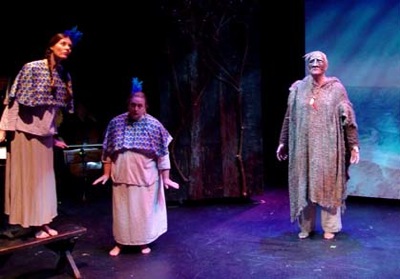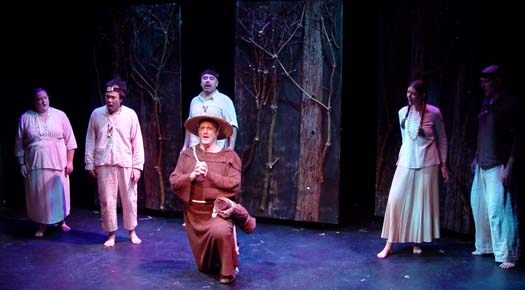Standing in the blood of history
A curious but effective work by Lisa Scola Prosek caused a stir at San Francisco’s Thick House Theater last Saturday, Jan. 31, where her new historical opera was greeted by protesters.
 As disjointed and magical as the 1927 novel by Jaime De Angulo on which it was based, The Lariat recreated the cultural and spiritual divide between the early Carmel Mission and local Native Americans. A descendant of those late eighteenth century villagers sang outside the theater as opera singers sang inside, and then burned sage to purify the night as theatergoers left.
As disjointed and magical as the 1927 novel by Jaime De Angulo on which it was based, The Lariat recreated the cultural and spiritual divide between the early Carmel Mission and local Native Americans. A descendant of those late eighteenth century villagers sang outside the theater as opera singers sang inside, and then burned sage to purify the night as theatergoers left.
Originally developed in cooperation with Louise Miranda Ramirez, an elder of the Ohlone/Costanoan-Esselen Nation of Monterey County, Prosek’s work combined Esselen language lyrics with melodies that De Angulo had researched and preserved, and then retooled them into her own musical voice.
Built from simple arpeggios and pentatonic scales, Prosek wove ancient sounds into a modern quilt, and then contrasted with Latin liturgy and Gregorian chant. Anchoring this history was the obsessive/destructive love of Franciscan Father Luis for a native woman. When the Father, sung by well-known bass-baritone Philip Skinner, began to whip himself as he sang, “The sins of the flesh… the flesh… the flesh,” we knew we were in for a rocky “love” story. Skinner’s rich bass and tortured quest for love and spirituality became one of the poles of this opera, highlighting a Spanish tradition that goes back to the Inquisition.
The other pole was Ishka, the object of Luis’ love and excellently sung and portrayed by mezzo Crystal Philippi. Her voice embodied a different outlook, with thick aspirants and visceral vowels, a musical fit for the magical realism that suffused the Native American segments of the story.
In their worldview of connection and animism, villagers glided through the forest, a shy and reverent part of the land. Blue jays scolded a soul-sick shaman and crickets sang a chirred duet, winged beings viewing our lives with dispassion. Soprano Maria Mikheyenko and mezzo Alexis Lane-Jensen sang both of those roles marvelously, along with playing multiple roles in the tightly choreographed troop. And the shaman, sung by bass Clifton Romig, added a slow gravity to his every scene.
Other parts that stood out included the early morning prayers, a Misere duet sung by Skinner and fellow priest, tenor Joe Raymond, in a decadent blending of Gregorian chant and chromatic slurs. Answering their prayer was a funeral chant from the village, with five voices mourning the dead shaman in a combination of warm harmonies and chilling near-Georgian dissonance.

Rounding out the cast, tenor Mark Hernandez inhabited the part of Ishka’s half-native suitor, Ruiz, with bright top notes and great energy, and baritone Wayne Wong helped drive the action as the native Pawi with fine acting and great ensemble work. Roham Sheikhani took on the non-singing role of Bear Chief Amomuths with a compelling presence and subtle stylized gestures. And even though he was not in a voiced part, he often stole the stage.
Diane Grubbe played multiple flute lines, switching back and forth from wooden to silver, and Leighton Fong took the other soaring instrumental line on cello. Percussionist Joel Davel added a wealth of atmospheres on electronic marimba, and composer Prosek anchored the whole with intricate piano work. And the whole was nicely conveyed on the small stage by Director/ dramaturg Jayne Wenger.
Ishka and the three men who loved her all die, deaths that are understated or obscure. Perhaps we are meant to understand that the tribes were dying with them, as were, not long after, the Missions.
But although there was a human face on tragedy, what the opera couldn’t really convey is the absolute horror of what occurred. The Monterey-area tribes tried to resist enslavement by the Missions, but Spanish conquistadores stole their children and they no longer had the heart to fight. In their tight confinement, their small numbers were further decimated by European diseases – measles, small pox and syphilis.
But what Prosek does do is capture some of the delicacy and mystery of De Angulo’s novel.
It is humbling to find their few descendants rebuilding their language and even protesting a story that could never do justice to the crime. And their protest? That the premiere should have been in Monterey, where it might assuage a restless ghost. That did not happen, but hopefully our closer Mission victims – Muwekma Ohlone and Miwok – can now find some comfort in the airing of this opera.

—Adam Broner
Photo top of Crystal Philippi as Ishka; below of Maria Mikheyenko, Alexis Lane Jensen and Clifton Romig, and bottom, of Philip Skinner in the foreground, and from back left are Alexis Lane Jensen, Wayne Wong, Mark Hernandez, Maria Mikheyenko and Clifton Romig; photos by Michael Strickland.
